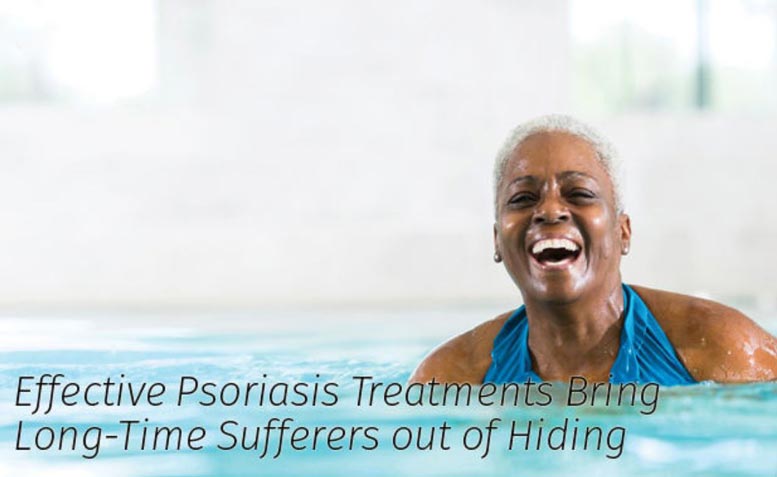
Itchy, flaky skin has driven psoriasis patients into hiding, but new treatments are bringing profound improvements to chronic sufferers.
As people are swapping coats and sweaters for shorts and tees, there’s one segment of the population that wants to stay covered up. To avoid unwanted attention and embarrassment, sufferers of psoriasis typically hide the unpleasant symptoms of their skin condition.
“Psoriasis is a chronic, non-contagious skin disease,” explains Edmonton-based dermatologist Dr. Perry Grewal. “It results in patients getting thick, red, flaky, itchy, painful plaques on various parts of their body.”
Dr. Grewal says about three to five percent of the population suffers from psoriasis which typically affects the elbows, knees, scalp, and lower back. Those suffering from milder forms of psoriasis may only have one or two patches of affected skin while severe psoriasis may cover larger parts of the body.
Psoriasis not only manifests itself in the skin but can also be associated with heart disease and inflammatory bowel disease. Psoriatic arthritis also affects about one-third of psoriasis patients.
Psoriasis misconceptions lead to stigmas
Much of the stigma that has evolved around this psoriasis is due to misconceptions of the general public. “If you’re in the same pool or if you shake hands with someone with psoriasis, it doesn’t mean that you’re going to get psoriasis,” says Dr. Grewal, emphasizing the disease’s non-contagious nature. Summer is an especially challenging time for psoriasis sufferers as trips to the beach or pool become stressful occasions.
Dr. Richard Langley, Professor of Dermatology at Dalhousie Medical School, has witnessed the profound negative impact psoriasis has on his patients’ quality of life. “I think of children who are teased at school, like one kid who was called ‘Alligator Boy’,” Dr. Langley says. He explains how his patients cover up and hide to avoid drawing attention to themselves. “Because of
Much of the stigma that has evolved around this psoriasis is due to misconceptions of the general public. “If you’re in the same pool or if you shake hands with someone with psoriasis, it doesn’t mean that you’re going to get psoriasis,” says Dr. Grewal, emphasizing the disease’s non-contagious nature.
Summer is an especially challenging time for psoriasis sufferers as trips to the beach or pool become stressful occasions. Dr. Richard Langley, Professor of Dermatology at Dalhousie Medical School, has witnessed the profound negative impact psoriasis has on his patients’ quality of life.
“I think of children who are teased at school, like one kid who was called ‘Alligator Boy’,” Dr. Langley says. He explains how his patients cover up and hide to avoid drawing attention to themselves. “Because of this, we see higher rates of depression, divorce, suicide, and alcoholism.”
“There have been tremendous advances in our understanding of the causes of psoriasis, and because of that, the treatments for psoriasis”
For milder cases of psoriasis, typical treatments include topical creams with steroids, salicylic acid, or charcoal. But, according to the Multinational Assessment of Psoriasis and Psoriatic Arthritis Survey, conducted in part by Dr. Langley, the majority of psoriasis sufferers weren’t aware there are more effective treatment options out there.
“More than 80 percent of patients that had severe psoriasis were still only on creams,” Dr. Langley explains. “Many of those patients had given up and they had not sought additional therapies because they weren’t aware of them, they were concerned about the safety of them or their physicians were not prescribing them.”
Tremendous advancements in psoriasis treatments
More effective therapies for psoriasis include phototherapy, which is a medical-grade UV treatment, injectable drugs called biologics, and new oral pills. “There have been tremendous advances in our understanding of the causes of psoriasis, and because of that, the treatments for psoriasis,” says Dr. Langley.
“While in the past we had difficulty controlling the disease, there are many new options available now that have an excellent benefit-risk profile. We’re able to control the majority of patients now with severe psoriasis in a safe manner.”
With effective treatment, psoriasis patients have enjoyed dramatic improvements not only in the clear appearance of their skin but in the lives they lead.
“I had one patient that was living in the basement playing video games all day — his parents were upset that he wouldn’t go out and get a job or make friends. He was becoming reclusive,” explains Dr. Langley, who saw the patient emerge from hiding and reintegrate back into society.
“When you remove the disease, it allows psoriasis patients to have normal lives again in every facet that you can imagine.”
Source article:
Media Planet – Andrea Yu, ca.editorial@mediaplanet.com